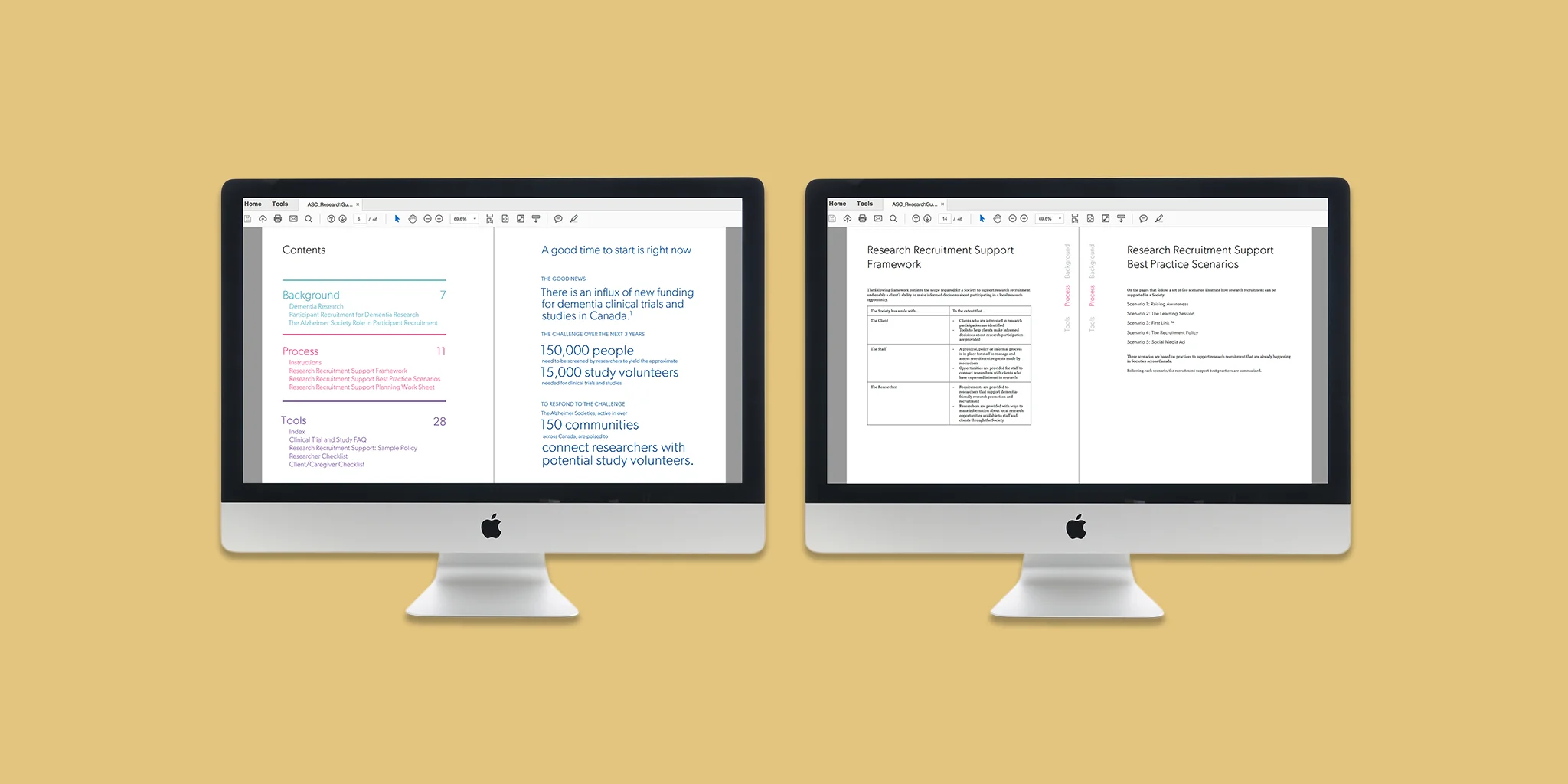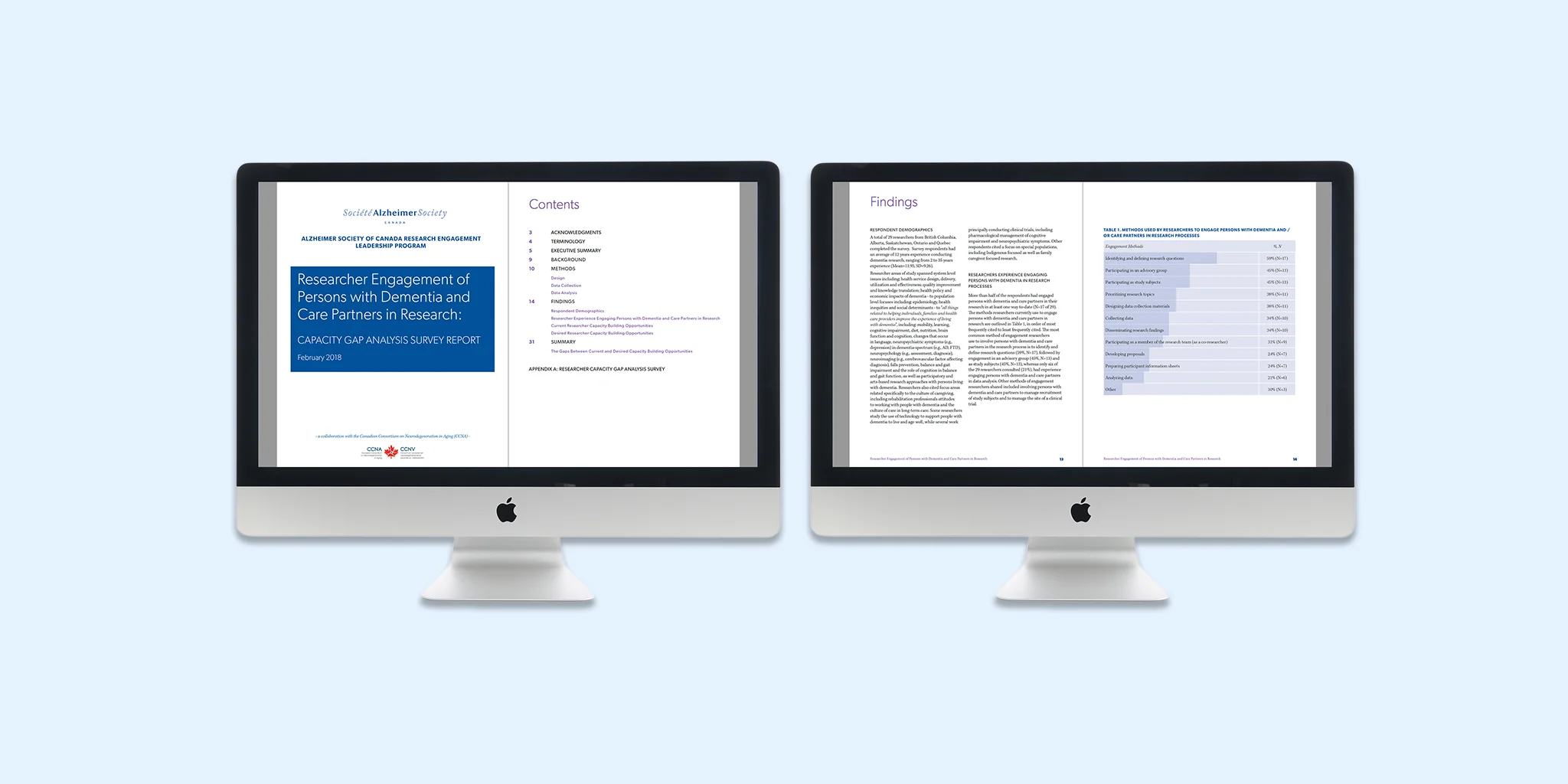Case Study 02. A knowledge exchange program for a Pan-Canadian charity to connect people to research.
The Challenge
Alzheimer disease and dementia is a growing national priority, as are the efforts to find a cure or significant treatment and care innovations. However, to yield approximately 15,000 study volunteers needed for the dementia clinical trials and studies currently going on in Canada alone, 150,000 people need to be screened by researchers. The Alzheimer Society of Canada wanted to capitalize on the presence of Alzheimer Society's across Canada to encourage and support clients to consider and make informed decisions about dementia research participation.
The Ask
In order to create the conditions for people living with dementia and their care partners to make informed choices about how research participation may or may not fit into their life goals, the Alzheimer Society of Canada asked GC to figure out how to strengthen knowledge among their Federated partners (Alzheimer Society Offices across the country) regarding the research process and support them to engage their clients in evidence-informed conversations about research participation and potential local opportunities. A driving aim of the Scientific Director was to explore how to "improve the culture around research" within Society Offices across the country.
“We all know that if you donate blood or an organ it’s “life-saving”; the public understands this but not in terms of research participation being ‘life-saving’ … look at the discourse around organ donation 20 years ago and how much it’s changed. This is how far the conversation about research participation needs to go.”
A Guide to Support Research Recruitment
“I was discussing with clients informally [prior to this program], but the Guide gave it quite a bit of structure for that conversation. It also gave me some insights in terms of what I could give to clients because people really want to walk away with something to use, and discuss. It’s been great to have something tangible to use to discuss one on one and in groups.”
The Program
In a Federated model, with 60 Alzheimer Society Offices across the country that are independent yet coordinated, we knew it was important to create an evidence-informed framework whereby Societies can identify their best way forward through facilitated reflection with their local teams. This led us to develop the Research Engagement Leadership Program, a three-year, multi-phase initiative that delivered:
A research recruitment best-practice evidence brief
A collaboratively designed and field-tested 'Guide to Support Research Recruitment' for local Societies, packed with cases, worksheets, sample policies and tools
Online coaching for local Societies in the process of working through the Guide and determining their plan to support research engagement locally
Online knowledge exchange sessions for Society staff to learn more about the research process and a Q&A with the Scientific Director
Online peer exchanges for Societies to discuss successes and / or challenges supporting research engagement with clients
Consultations (focus groups and interviews) to better understand relationships amongst local researchers, physicians, and Alzheimer Society Offices
Capacity gap analysis of dementia researcher engagement of persons with dementia and care partners in research in partnership with the Canadian Consortium on Neurodegeneration in Aging (CCNA)
An outcome evaluation to identify the resulting practice changes in Alzheimer Society Offices put in place as a result of participating in this program
“This program launched me into thinking differently about the Federation Partner model and what was bothering me about it – this was the start of, or first time, I could see how it could look different, working with ASC across the Federation in a different way.”
Capacity Gap Analysis Survey Report
“Now, if someone is wanting to participate in research we have all staff informed. We take a “whole-organization” approach so that all staff are aware of the opportunities available to clients and what tools we have to support them in their decision making. We really try to build it into systems and track it. Helping to connect people with research opportunities became part of our Strategic Plan – which helps us keep tracking a priority to report to the Board of Directors.”
The Results
By taking this approach, the vision of Alzheimer Society of Canada could be realized in a way that accommodated (and celebrated!) the vast differences in practice contexts of Societies across the country. Every Society that participated in the program told us that in one way or another, they made changes to how they approach conversations about research participation with their clients. Changes for the better. The opportunity to reflect, discuss and plan as a team, with guidance and support rather than a policy and training driven approach was an overwhelmingly positive one. Societies consistently told us of new or updated policies, changes to staffing models, new approaches to conversations with clients, heightened awareness of what research recruitment is all about, enhanced commitment to provide a chance for their clients to consider if or how research may be part of their journey, and renewed or strengthened passion to support dementia research as all notable outcomes for themselves. By participating in the program, Societies recognized where the need for improvement resided - and took action on those opportunities in ways that worked best for themselves. Staff are more confident, and more likely to proactively talk with clients about the possibilities of research participation and with researchers about how they can be of support.
In terms of what researchers are seeking, this program identified that they desire to learn more about the ways people would like to be involved in research, the ethics of engaging people, as well as how to create better protocols that consider issues related to symptoms, diagnosis, and treatments as research unfolds. We also identified that researchers would like to see specialized funds and/or granting processes, services or registries that would identify and inform potential participants and support to help objectively and compassionately assess the needs or experience of persons with dementia and care partners who are participating in research. ASC will be informed by these desires in future efforts to engage with the research community.
“[I would like to see] basic information and training about how to engage people, as well as discussions about how to reconcile differences between lived experience and research (e.g., different types of knowledge, institutional constraints, etc.). Also I think that this discussion needs to include when meaningful engagement may not be appropriate, in order to avoid tokenistic engagement.”
The Publications
As part of this initiative, we conducted a process evaluation and published the results with ASC in the peer-reviewed journal, Alzheimer's & Dementia: Translational Research & Clinical Interventions. This is an open access journal so you can view the article here.
We also recently conducted an outcome evaluation and the results are in-press - to be shared here once published!


